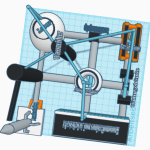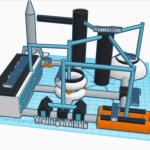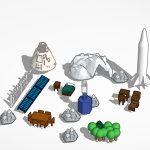The Luna Base by The Luna Base
RK Basisschool De Zon De Kwakel-Noord-Holland Netherlands 10 years old 3 / 3 Dutch Moon
External link for Tinkercad 3D design
Project description
Onze maanbasis hebben we gebouwd, zodat we onderzoek kunnen doen en meer te weten kunnen komen over wat het met je lichaam doet. We hebben onze buitenste zijde gemaakt van driehoekjes. We nemen een driehoek mee en de rest maken we van maanstof met een 3D printer. Die driehoekjes hebben we gemaakt van maanstof, we smelten de grondstof en dan doen we het in de 3d printer. We hebben er ook een fiets op de maanbasis waarmee we ook energie opwekken. De trappers van die fiets worden automatisch achteruit getrokken voor meer spanning, zo train je ook nog je spieren.
2.1. We gaan onze maanbasis bouwen bij de noordpool want daar zijn aangenamere temperaturen, het is er niet te heet en ook niet te koud en van de ijskappen kun je water halen. We gebruiken niet alleen de ijskappen voor water maar ook wat er in de maan zit, want in de maanbodem zit ijs.
2.2. We gebruiken dezelfde materialen als een raket, oftewel aluminium en titanium.Maar we gebruiken ook maanstod. Weggaan onze maanbasis bouwen door allemaal losse driehoeken en die maken we van maanstof met een 3d printer. De maanstof smelten we zodat het in de 3d printer kan. die 3d printer nemen we wel mee van de aarde want anders wordt het wel heel moeilijk.
2.3.
Water
Voor aan water te komen filteren onze urine en al het andere vicht dat we verbruiken. Dat zetten we om in drinkbaar water. En we halen ook water uit de ijskappen.
Voedsel
Voor eten hebben spinazie, rijst en rucola omdat dat snel groeit. Het groeit in een apart gebouw. We hebben een doek dat we soms over de koepel doen zodat de planten niet te veel zon hebben. Als de zon niet schijnt hebben we lampen die voor licht zorgen.
Energie
Voor de elektriciteit hebben we zonnepanelen en zodat er ook elektriciteit als het donker is, hebben we heel grote batterijen. Er is ook een trainingsfiets die elektriciteit opwekt.
Lucht
Voor zuurstof is er een buis die verbonden is met het gebouw waar de planten worden verbouwd en die planten zuiveren CO2 om in zuurstof. Voor de zekerheid hebben we een installatie die de lucht zuivert. Om de zuurstof binnen te houden hebben we een driedubbele deur.
Veilig naar buiten
Zodat je veilig naar buiten kan hebben de astronauten een ruimtepak dat al bestaat. DSit pak is stevig en bestand tegen micro-meteoren en straling uit de ruimte.
3.1. De astronauten die in de maanbasis wonen, staan ‘s morgens op en gaan zich eerst wassen. Hiervoor is er een koffertje waar allemaal spullen in zitten waarmee je je kan wassen. Dan gaan ze eten. Daarvoor kunnen ze naar de opslag voor ingevroren voedsel of ze kunnen verse groente plukken in het speciale koppel waar de planten groeien. Als ze zich gewassen hebben en ontbeten gaan ze onderzoek doen zoals; kan een plant groeien zonder zuurstof en is het maanzand geschikt om er planten op te laten groeien? We kijken ook wat zo lang heel weinig zwaartekracht met je lichaam doet. De astronauten hebben natuurlijk ook af en toe wat tijd voor zichzelf. De astronauten slapen in slaapzakken die vast aan de muur zitten.
English translation
We built our moon base so we can do research and learn more about what it does to your body. We made our outer side out of triangles. We take a triangle with us and we make the rest from moon dust with a 3D printer. We made those triangles from moon dust, we melt the raw material and then we put it in the 3D printer. We also have a bicycle on the moon base with which we also generate energy. The pedals of that bicycle are automatically pulled back for more tension, so you also train your muscles.
2.1. We are going to build our moon base at the North Pole because there are more pleasant temperatures there, it is not too hot nor too cold and you can get water from the ice caps. We not only use the ice caps for water, but also what is in the moon, because there is ice in the moon’s soil.
2.2. We use the same materials as a rocket, i.e. aluminum and titanium. But we also use moon stodge. We are going to build our moon base using all kinds of separate triangles and make them from moon dust with a 3D printer. We melt the moon dust so that it can be put in the 3D printer. We will bring that 3D printer from Earth with us, otherwise it will be very difficult.
2.3.
Water
To get water we filter our urine and all the other food we consume. We convert that into drinkable water. And we also get water from the ice caps.
Food
For food, have spinach, rice and arugula because it grows quickly. It grows in a separate building. We have a cloth that we sometimes put over the dome so that the plants don’t get too much sun. When the sun doesn’t shine, we have lamps that provide light.
Energy
We have solar panels for electricity and so that there is electricity even when it is dark, we have very large batteries. There is also an exercise bike that generates electricity.
Sky
For oxygen, there is a pipe that is connected to the building where the plants are grown and the plants purify CO2 into oxygen. To be on the safe side, we have an installation that purifies the air. We have a triple door to keep the oxygen in.
Get outside safely
So that you can go outside safely, the astronauts have a space suit that already exists. DSit suit is sturdy and resistant to micro-meteors and radiation from space.
3.1. The astronauts who live in the moon base get up in the morning and first wash. There is a suitcase for this that contains all kinds of things you can use to wash yourself. Then they go to eat. For this they can go to the frozen food storage or they can pick fresh vegetables in the special flock where the plants grow. Once they have washed and had breakfast they will do research such as; Can a plant grow without oxygen and is the moon sand suitable for growing plants? We also look at what so little gravity does to your body for so long. Of course, the astronauts also have some time for themselves every now and then. The astronauts sleep in sleeping bags that are attached to the wall.
#3D Design
Other Projects










